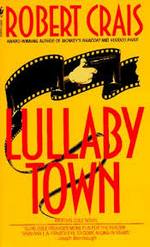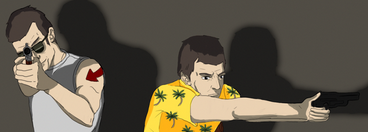 Lullaby Town
Lullaby Town
by Robert Crais
Series: Elvis Cole, #3
Mass Market Paperback, 352 pg.
Bantam, 1993
Read: August 21, 2014

The third book in the Elvis Cole series is about sixty pages longer than the previous — and it was about sixty pages longer than the first. This isn’t a trend that will continue, I say with some relief (in fact, I believe the next will be shorter). But the growth isn’t just in page count; it’s in depth of story, depth of character, and the way Crais deals with making sure neither plot nor character get short-shrifted in this.
There’s an obvious effort here to establish a series continuity here with The Monkey’s Raincoat. We get the return of Pat Kyle and her laugh — and that would be enough to help establish this book’s place in the Cole-verse, but we get more. As he spends time sticking out like a sore thumb in a small town, he reminisces about the first time he visited Watts with Cleon Tyner and felt the same way. We also see (and get a reference to) Ellen Lang, briefly. She’s doing much better than she was when we saw her last. In Stalking the Angel, Elvis makes reference to keeping in touch with a couple of former clients, and with Ellen’s appearance we see him doing that again. Unlike with the clients in Stalking, she wasn’t there as a plot device, she was just there to let series readers know that she was still around. I really appreciate little touches like that.
If one’s an incident, two’s a coincidence, and three’s a pattern, we have ourselves a legitimate pattern established. For the third book in a row, Elvis is approached by a potential client/representative of a potential client who is difficult or obnoxious. Elvis will say that he’s not taking the case for the difficult client/client representative, but he will for the likable/put-upon representative/client. I can see why Crais uses this — Elvis gets to show some independence, some graciousness to the non-obnoxious person, and even a little wit in the way he phrases it. But, it’s getting to be lazy returning to this so often. Then again, if I wasn’t reading these so close to each other, I probably wouldn’t have noticed this pattern. So who am I to say?
So here’s the setup: Peter Alan Nelson, the 3rd biggest director in the world (mostly action flicks, apparently — a proto-Michael Bay, but one who’s not as Bay-ish, let’s hope) dumped his wife and kid just before he made it big. It’s been ten years and he’s feeling bad about that now, and wants to get to know his son. So the studio hires Elvis to find them. He does so, she’s living on the other side of the country, appears to have actually done okay for herself, the boy seems good — really, the last thing they need is a brash, self-obsessed, Hollywood type to interrupt their lives. But that’s what Elvis was paid to help with — but first he wants to check into something odd about Nelson’s ex. Turns out, she’s under the thumb of the capo di tutti capi. So before Elvis unleashes Hurricane Peter into their lives, he and Joe Pike will have to see about removing that thumb.
The tension is high, the solution isn’t obvious — and isn’t easy to achieve, either. Elvis does a pretty neat job investigating things to find Heather Lloyd in the first place and he has to do plenty more to figure out how to extricate her from this situation. There’s a good deal of sleuthing in this book, which really makes up for last time. Teach me to be snarky about that. Sure, they’ve got the ex-cop with all the connections and some power, Rollie George, to act as a font of all knowledge and help them navigate a city they aren’t familiar with. But that really doesn’t come across as a cheat — Elvis still has to act on the info given and turn it into something. Rollie cuts out a lot of time, but he doesn’t hand him anything wrapped in a bow. Having someone be a source of local information can really help keep things moving plot-wise.
This time out, the Peter Pan quest, protection of innocence — whatever you want to call it — is very brief and understated. If anything we see the dangers of that kind of life — Peter Alan Nelson could arguably be considered an eternal youth, with expensive toys to play with — but his demeanor, self-centeredness and lack of ethical code make him a very different kind of child than Elvis. If you’re going to hold on yo your childhood, do it the right way, or you end up as a petulant slob. There’s a child-like way of approaching things, and a childish manner. Cole’s not interested in the latter one bit. It’s interesting to watch Elvis draw the distinctions, or at least act on distinctions that he’s drawn, so that we can see what they are. You also have to wonder, seeing Peter Alan Nelson throw a fit, if Cole seeks to shed a bit of his version of Peter Pan so that he won’t act like “that guy.”
Lullaby Town has moments of humor throughout, but like Stalking, it’s not as jokey as Monkey’s was. The wit is there, he just doesn’t feel the need to break it out as often. Or when he does (and he’s not just provoking annoying clients or self-important mafia persons), there’s a purpose, to illustrate something, to reveal something — or to break monotony. Either way, Crais is learning how to let situations drive this kind of thing.
Portrait of the Big City Detective sitting on a small-town bench, ferreting. In the cold. People passed on the sidewalk, and when they did they nodded and smiled and said hello. I said hello back to them. They didn’t look as cold as me, but perhaps that was my imagination. You get used to the weather where you live. When I was in Ranger School in the Army, they sent us to northern Canada to learn to ski and to climb ice and to live in the snow with very few clothes. We got used to it. Then they sent us to Vietnam. That’s the Army.
Our knowledge of Elvis isn’t enhanced a lot by this novel, but what we do get is important. On the not-so-important side, we get a definitive note from him about giggling – he doesn’t like it (which maybe was hinted at before, but his displeasure wasn’t as explicit). We do get confirmation of a good deal here, his character, his willingness to help those who need it, but can’t afford him — that sort of thing. He gives Karen a concise explanation for why he decided to help her rather than turn things over to the police.
“And you haven’t told the police?”
“No.”
“But those men beat you up.”
I said, “I knew something was wrong and I wanted to find out what it was. Cops deal with the law. The law isn’t usually concerned with right and wrong. Ofttimes, there are very large differences.”
She shook her head as if I’d spoken Esperanto.
Elvis is solidified here as your hard-boiled hero. It’s not about legal/illegal, it’s about right and wrong — an objective morality. This is the core of Elvis Cole, and even Joe Pike — why do they do what they do? From tearing up Ellen Lang’s check, to carrying on the search for Mimi Warren after being fired, to putting themselves out on the limb for a client they were only hired to find (and who can’t pay them anything). This is it.
As the action in this one takes place no where near the LAPD, we don’t get to see the antagonism they have for Joe Pike, but we learn a little bit about him. Bit by bit, we’re getting a picture of Pike so that when we do eventually learn a good deal, there’s an impact. As tensions are at their highest between Elvis and the mafia, we get this exchange:
I asked Pike, “Are you afraid?”
He shook his head.
“Would you be afraid at midnight if we were alone?”
He walked a moment. “I have the capacity for great violence.”
I nodded. So did I. But I thought that I might still be afraid.
…
“Elvis?”
“Yeah?”
“I remember being afraid. I was very young.”
and that’s all we get about that. For now. But it hints at something serious — that we will explore in the future. As serious a moment as that was, I have to chuckle at Pike’s “I have the capacity for great violence.” Yeah, no kidding, buddy — never would’ve guessed.
I don’t know if I can successfully describe why I like this one so much — not that I had real problems with the first two books, but this one seems to have everything clicking and only the minor-est of problems. Funny, snappy writing, solid action, a complex solution, and growth and development in multiple secondary characters. There will be higher points in the series, but for awhile, this will be the standard by which Cole novels are measured by me.
Coming up next: Free Fall which is definitely a departure for Crais, Cole and Pike in many ways.
—–

—–
Drawing by Kirsty Stewart, chameleonkirsty on deviantART, used with permission.


Read Irresponsibly, but please Comment Responsibly